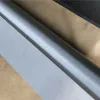Jan. 30, 2024
Choosing the right stainless steel screens involves considering various factors to ensure they meet your specific needs and application requirements. Stainless steel screens are widely used for filtration, separation, and sieving purposes in industries such as food processing, pharmaceuticals, chemicals, and more. Here's a guide on how to choose stainless steel screens:
Material Grade:
Consideration: Stainless steel screens are available in different grades of stainless steel, each offering varying levels of corrosion resistance, strength, and durability.
Recommendation: Select a stainless steel grade that suits the environmental conditions and corrosive elements to which the screens will be exposed. Common grades include 304, 316, and 316L stainless steel.
Mesh Size:
Consideration: Mesh size refers to the number of openings per linear inch in the screen. It determines the particle size that can pass through or be retained by the screen.
Recommendation: Choose a mesh size based on the specific filtration or separation requirements of your application. Finer mesh sizes are suitable for smaller particles, while coarser meshes are used for larger particles.

Weave Type:
Consideration: Different weave types, such as plain weave, twilled weave, and Dutch weave, offer varying levels of strength, flexibility, and filtration efficiency.
Recommendation: Select the weave wire mesh based on the application requirements. Plain weave is commonly used for general-purpose applications, twilled weave for strength and flexibility, and Dutch weave for precise particle retention.
Wire Diameter:
Consideration: The diameter of the wires used in the screen affects its overall strength, stability, and resistance to wear and tear.
Further reading:Recommendation: Choose the appropriate wire diameter based on the mechanical stresses the screen will undergo during its use. Thicker wires offer increased strength and durability.
Screen Opening Shape:
Consideration: Screens can have square, rectangular, or slotted openings. The shape of the openings influences the flow of materials through the screen.
Recommendation: Consider the characteristics of the material being processed and the desired flow pattern. Square openings are common for general-purpose applications, while slotted openings are suitable for specific sizing needs.
Surface Finish:
Consideration: The surface finish of the stainless steel screens wire mesh can impact their cleanability, resistance to corrosion, and overall appearance.
Recommendation: Choose a surface finish that aligns with your sanitation requirements and aesthetic preferences. Common finishes include mill finish, polished, and electro-polished surfaces.
Application-Specific Considerations:
Consideration: Consider the specific requirements of your application, such as temperature resistance, chemical compatibility, and regulatory standards.
Recommendation: Ensure that the chosen stainless steel screens meet the necessary criteria for your industry and application. Consult with suppliers or manufacturers to determine if customization is needed.
By carefully considering these factors, you can select stainless steel screens that are well-suited for your intended application, ensuring optimal performance, longevity, and efficiency in your filtration or separation processes.
Previous: 6 Things to keep in mind when buying steel online
Next: None
Related Articles
If you are interested in sending in a Guest Blogger Submission,welcome to write for us!
All Comments ( 0 )